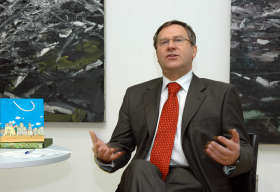A Truly World-Class Public Sphere Is Important

Michael Schwarzinger, former Austrian Embassador to Lithuania
At the get-together “Kopfstand 09”, Michael Schwarzinger spoke of Lithuania, the country in which he recently served as Austrian ambassador, and its capital Vilnius.
Kopfstand 09January 18, 2007, Galerie Maerz
Michael Schwarzinger was Austria's ambassador to Lithuania for five years. At this latest installment of “Kopfstand 09” held at Galerie Maerz, he confidently predicted that the European Capital of Culture year would have a positive impact on Vilnius, the city that will be sharing 2009 honors with Linz. Among the factors he brought out in this connection were the dramatic vicissitudes of that country’s history.
In Schwarzinger’s view, an essential byproduct of carrying out Vilnius’ Capital of Culture year will be to endow Lithuania’s national and international identity with a higher profile—even if this fact is not sufficiently appreciated in many quarters. Indeed, one prerequisite he identifies for achieving that aim is recognizing the task as a social challenge of a cultural, economic and political nature and not regarding it merely as a graciously bestowed prize that will allow the country to rest on its laurels and leisurely await the good times to come.
One impediment that Schwarzinger sees on Lithuania’s path to the conception of self that it needs to attain are the many historical caesuras in that country’s past—above all, the numerous and varied claims that have been lodged to that Baltic land. Aside from a few brief phases of national independence, Lithuania was taken over by the Polish monarchy and the Russian czar, the German fascists and the Soviet communists. Moreover, the enlightening influence that Jewish intellectuals previously had on the life of the mind in Lithuania was completely annihilated in the Nazi Holocaust. And since the country’s autonomy was re-established only in 1991, historians have had enormous difficulties doing the important job of coming to terms with the past, and the majority of the populace has no great interest in participating in this process.
The city’s two symphony orchestras, university, conservatory, many and varied theater companies and its wealth of imagination in staging cultural events in the absence of generous funding are, for Michael Schwarzinger, proof of the existence of sufficient “intellectual capital” to make the Vilnius Capital of Culture year a success. What’s lacking, in his opinion, is a truly world-class public sphere in that country, which would accelerate the process of social renewal. At least that’s been the case until now. But, after all, Vilnius, with 550,000 inhabitants, is the only true metropolis in the region, and is thus destined to play a key role in the intellectual, creative and economic exchanges that now characterize ongoing European integration. The intense public attention that can be expected to be focused on Vilnius and Lithuania most certainly make the effort worthwhile since, in Michael Schwarzinger’s view, “public attention is the currency of the 21st century.”





